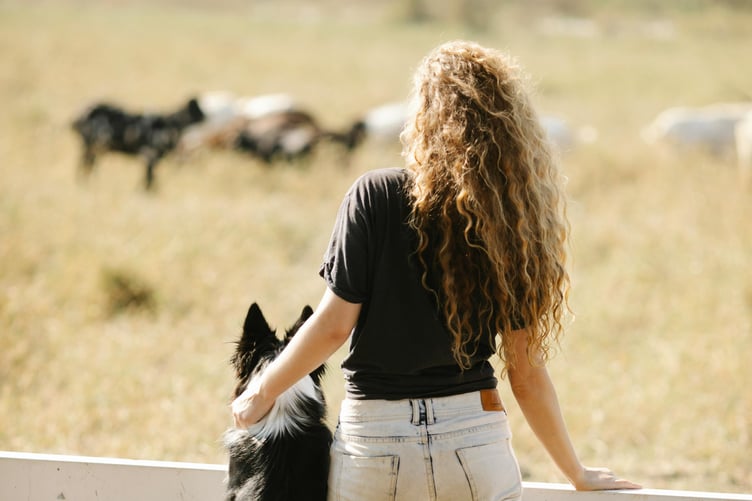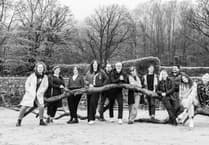Complacency among some dog owners, alongside an inability to control their pets, has seen dog attacks on Welsh livestock cost an estimated £883,000 last year, more than double the 2022 cost (£439,000) latest figures from NFU Mutual reveal.
The shocking statistics come as NFU Mutual’s latest survey of over 1,100 dog owners released on Monday, February 26 found more people were letting their dogs off leads in the countryside last year than in 2022, 68 per cent and 64 per cent respectively.
Worryingly, less than half (49 per cent) said their pet always comes back when called.
Almost eight per cent admitted their dog chases livestock but 46 per cent believed their dog was not capable of causing the death or injury of farm animals. More than half (54 per cent) felt they did not need to take active measures to prevent their dog from chasing.
If present at an attack, 57 per cent of dog owners would intervene to stop it, 22 per cent would report it to a local farmer and 11 per cent would call the police.
Across the UK, dog attacks on livestock were estimated to cost £2.4 million last year, up nearly 30 per cent compared to the previous year
It comes as the Dogs (Protection of Livestock) (Amendment) Bill is making its way through parliament. NFU Mutual welcomes this Bill, which improves powers available to police for dealing with dog attacks on livestock.
Owen Suckley, NFU Mutual Wales Manager, said: “The shocking increase in the Welsh cost of dog attacks on livestock is incredibly alarming news for farmers, especially as the 2024 lambing season gets underway and pregnant ewes and newborn lambs are vulnerable.
“We’ve heard reports from farmers about the complacency and naivety of some dog owners who regularly allow their pets to roam off-lead in the countryside, seemingly unaware of the carnage the dog could cause, then are horrified when an attack happens.
“There have also been incidences where dogs have chased, injured and killed sheep and the owner is nowhere to be seen.
“Farmers are also living in fear of repeat attacks, which cause horrific and needless suffering to livestock and can traumatise all involved dealing with the aftermath.
“All dogs are capable of chasing, attacking and killing farm animals, regardless of breed, size or temperament.
“We’re urging all dog owners to be responsible for their pet and keep them on a lead when walked anywhere near livestock. If there is an attack, it is important people accept responsibility and report it, to a local farmer and the police, so that the injured animals are not left suffering in pain.”
Rob Taylor, Wales Rural and Wildlife Police Crime Coordinator and NPCC Livestock lead, added: “Ever since I started the first dedicated police rural crime team in North Wales in 2013, we have witnessed on a daily basis the devastating impact of livestock attacks by dogs and the effect of irresponsible dog ownership on our rural communities.
“Campaigns and awareness have a limited effect, as some dog owners just simply don’t heed our warnings and the attacks continue, as evidenced by the recent statistics from NFU Mutual.
“Over several years we have been engaged and worked with the UK government and DEFRA to seek a new and effective up to date law, to aid police investigations, protect farmers, livestock and ultimately bring those irresponsible dog owners to justice.
“We are hopeful that a recent private members bill will be successful this year and that we can make a big step forward in utilising this new law and reducing the impact that livestock worrying has on our farming communities here in Wales.”
Over 80 sheep were killed in two attacks on Alun James’ remote farm in Carmarthenshire.
The attacks, among the most devastating livestock attacks in Wales, took place in spring 2023.
The first attack was witnessed by Alun’s mother. She managed to drive the dog off-but it left a trail of carnage behind with ewes and lambs dead in the field.
Some of the surviving sheep’s’ jaws were so badly injured that they couldn’t eat, and they had to be put down. Other sheep and lambs were driven into the nearby river where some drowned. Altogether, 36 sheep were killed in the attack.
Six weeks later another attack took place in the same grazing ground. Fifty sheep were killed or swept away in the river despite Alun’s desperate efforts to save them from drowning.
Alun believes both attacks were carried out by a single large husky-type dog from a nearby property.
Although it was never proved to be responsible for the attacks, this dog has now been rehomed.
“The attacks were horrific and left us shaken to the core,” said Alun. “My mother saw the dog attacking our sheep and breaking their necks by tossing them into the air.
“As well as causing horrific suffering, it’s left us in a state of shock.
“We’re in a remote area and have not had dog attacks for a long time - the last I can remember was over 40 years ago.
“Our local NFU Mutual Agent sorted out the claims for the lost sheep and vet bills but it’s still one of the worst things to have hit the farm in my lifetime.”
Alun keeps 1,500 Welsh Talybont ewes on his 300 acre farm near Llangadog in Carmarthenshire. One of the larger types of Welsh mountain sheep, the Talybont is bred around the Usk valley and the Black Mountain.
A fourth-generation farmer, Alun has farmed sheep in the Welsh mountains all his life.
With many dog owners planning to visit the countryside at a time when sheep and lambs are at their most vulnerable, NFU Mutual is calling for them to:
– Keep dogs on a lead when walking in rural areas where livestock are kept but let go of the lead if chased by cattle
– Be aware that all dogs, regardless of size, breed, and temperament, can cause the distress, injury and death of farm animals
– Report attacks by dogs to the police or local farmers
– Never let dogs loose unsupervised in gardens near livestock fields – many attacks are caused by dogs which escape and attack sheep grazing nearby.
Responding to previous figures that showed how the cost of livestock worrying to farmers increased by 50 per cent between 2019 and 2022 as the boom of puppies purchased during the pandemic came of age, Kate Salmon, campaign manager at Naturewatch Foundation, said:
“We think the devastating consequences for all animals involved in livestock worrying and attacks are massively underestimated, with it being a genuine possibility that your dog will also not make it home, which no one wants to see happen and could be avoided if dog walkers ensure they are acting responsibly.”
With lambing season well underway, Wales Rural and Wildlife Crime Coordinator Rob Taylor said recently: “Attacks on livestock are completely preventable through responsible dog ownership. Sadly, attacks on pregnant ewes or newborn lambs at this time of year do still occur.
“We ask that owners are aware of the risks, use a precautionary approach in controlling their dog and understand the route on which they take them to exercise.





Comments
This article has no comments yet. Be the first to leave a comment.